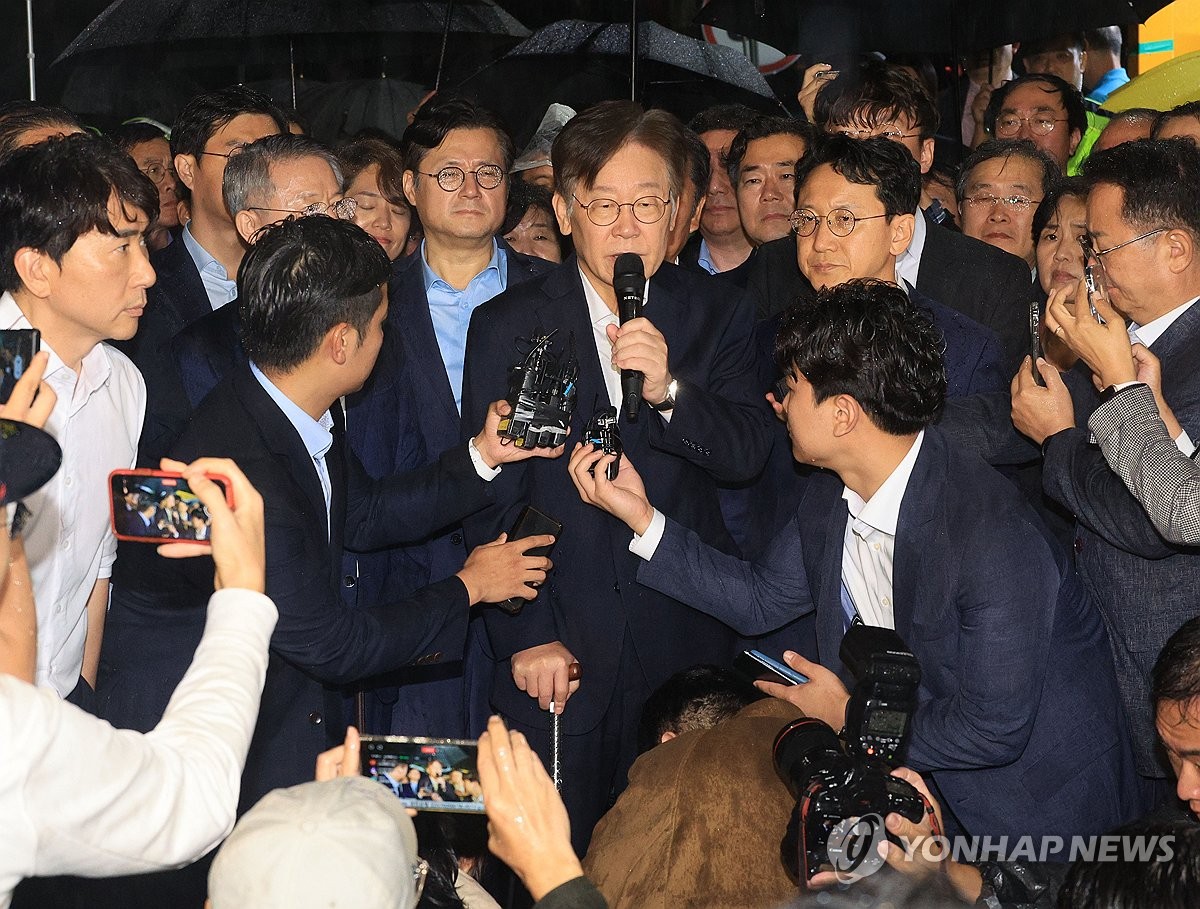- California Assembly OKs highest minimum wage in nation
- S. Korea unveils first graphic cigarette warnings
- US joins with South Korea, Japan in bid to deter North Korea
- LPGA golfer Chun In-gee finally back in action
- S. Korea won’t be top seed in final World Cup qualification round
- US men’s soccer misses 2nd straight Olympics
- US back on track in qualifying with 4-0 win over Guatemala
- High-intensity workout injuries spawn cottage industry
- CDC expands range of Zika mosquitoes into parts of Northeast
- Who knew? ‘The Walking Dead’ is helping families connect
Court rejects arrest warrant for opposition leader Lee over corruption charges
A Seoul court on Wednesday rejected an arrest warrant sought for opposition leader Lee Jae-myung over corruption charges, a decision that averted the biggest crisis yet for the former presidential candidate.
The Seoul Central District Court made the decision following a hearing attended by Lee, chair of the Democratic Party (DP). It marked the first time the leader of South Korea’s main opposition party has attended an arrest warrant hearing.
“In comprehensive consideration of the degree to which the defendant’s right to defense is needed and the extent of concerns about the possible destruction of evidence, it is difficult to see the rationale and need for his arrest to the extent that the principle of investigation without detention should be ruled out,” a court judge said.
Soon after the court’s rejection, Lee expressed his appreciation to the judiciary for “manifestly proving that it is the last bastion of human rights.”
“Again, I am deeply grateful to the judiciary for solidly safeguarding the constitutional order of the Republic of Korea and for its wise judgement,” he told a throng of reporters as he walked out of a detention facility where he waited for the court’s decision.

The decision came days after Lee pulled out of his hunger strike launched on Aug. 31 in protest of what he called the “incompetent and violent” government of Yoon Suk Yeol.
On Tuesday, a frail-looking Lee walked slowly and unsteadily while leaning on a walking stick in one hand and holding up an umbrella with the other as he entered the court for a hearing without answering a barrage of questions from reporters.
Hundreds of supporters and protesters lined the road to the court, holding up placards reading “Lee Jae-myung is innocent. Reject the arrest warrant,” or “Suspect Lee Jae-myung is the ringleader.”
Lee has been accused of breach of trust, bribery and other charges stemming from his time as mayor of Seongnam, south of Seoul, years ago in connection with a scandal-ridden land development project and his alleged involvement in a company’s illegal cash remittance to North Korea.
The prosecution accuses Lee of committing breach of trust worth 20 billion won (US$15 million) by giving special treatment to a private developer in the Baekhyeon-dong district apartment project in the city of Seongnam, south of Seoul, between 2014 and 2015, when he was serving as the city’s mayor.
Lee is also suspected of asking Ssangbangwool Group, an underwear maker, to illegally transfer $8 million to North Korea between 2019 and 2020, when he was serving as Gyeonggi Province governor, through his deputy to facilitate his visit to the North, and push for a joint smart farm project between his province and Pyongyang.
During the morning session of the hearing, prosecutors reportedly highlighted the seriousness of the charges and concerns of destroying evidence as they made a case for Lee’s arrest, while Lee’s lawyers claimed he is not a flight risk and thus arresting him for investigation is unnecessary.
The court rejection is widely expected to bolster Lee’s standing in the party in the run-up to the general elections in April and would lead to a massive blowback against the government.
By law, sitting lawmakers are immune from arrest while parliamentary is in session unless the National Assembly passes a motion giving its consent to the arrest, a measure intended to shield lawmakers from political persecution.
Last week, the National Assembly voted to lift the opposition leader’s arrest immunity in a surprise, narrow 149-136 vote attributed to a number of dissenting ballots from his own party that commands a majority of parliamentary seats.
The DP has vehemently lambasted the motion as the government’s attempt to “kill a political enemy” eight months before the general elections.
Lee is already standing trial on two other separate cases, involving alleged election law violations during his run for the 2022 presidential election and corruption charges connected to another property development project launched during his term as Seongnam mayor, respectively.
In February, the parliament had voted to reject the government’s first request for consent to arresting the DP leader by a margin of only one vote.
Lee has been under medical treatment since he was hospitalized on Sept. 18 due to deteriorating health during his hunger strike. He has been put on treatment for recovery after ending the hunger strike on its 24th day on Saturday.











